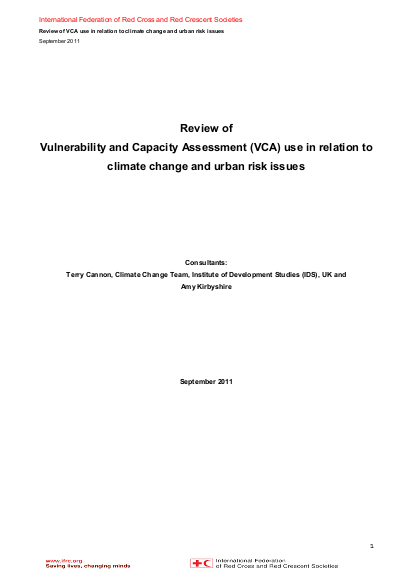
This report was commissioned by the IFRC to re-examine the Vulnerability and Capacity Assessment process in the context of increased institutional experience in using VCA, along with changing risk patterns. In particular the review is to assess the relevance of VCA for dealing with urban risks and climate change. It looks closely at the continued relevance of the framework, practices and supporting materials, and the potential for adapting VCA to incorporate climate change and be of use in urban areas. It is based on the views of fifty people from IFRC, National Societies (NSs), and Participating National Societies (PNSs) who have been involved in using VCA. The draft report was circulated to many of these initial panel plus others in the IFRC, and this version includes many of the comments submitted by around ten people. The first part of the report assesses current use of VCA, the constraints it faces, and how those constraints may affect the success of extending VCA to incorporate the new areas of climate change and urban risk. This brought up many issues, including perceptions of VCA, training, practitioner capacity, raised expectations, funding, the VCA booklets and VCA monitoring and reporting.
Resource collections
- Evaluating humanitarian action
- Monitoring and Evaluation (M&E)
- Monitoring of humanitarian action
- UN Habitat - Urban Response Collection
- Urban Response - Urban Crisis Preparedness and Risk Reduction
- Urban Response Collection - Community Engagement and Social Cohesion
- Urban Response Collection - Economic Recovery
- Urban Response Collection - Environment and Climate Change
- Urban Response Collection - Housing, Land and Property
- Urban Response Collection - Urban Crisis Response, Recovery and Reconstruction
- Urban Response Collection - Urban Resilience